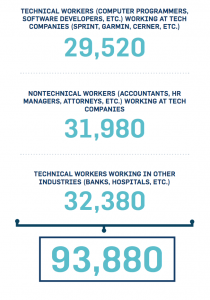Each day, Kansas City is better positioning itself to be the Midwest’s tech hub.
But for Kansas City to realize its full potential, tech leaders, policymakers and the community need to do more to cultivate homegrown talent, KC Tech Council president Ryan Weber said.
“Attracting talent from another city is a very small game — and often a losing game,” Weber said. “But the ability to train and grow talent that’s already here is the land of opportunity.”
On Friday, the KC Tech Council released a detailed report analyzing the area’s tech industry, including a focus on how to increase area tech talent. The report found that the current labor force is insufficient to fill the expected demand for tech jobs in the area.

source: KC Tech Council
Kansas City’s tech industry is directly responsible for 93,880 jobs, according to the report. That total is comprised of tech workers at tech companies, non-tech workers working at tech companies and tech workers working at non-tech companies.
“The numbers don’t lie,” Weber said. “In general, we know there’s roughly 1 million workers in Kansas City, and if roughly 100,000 of them are working in tech you can round those numbers to say that almost 1 in 10 Kansas Citians directly contribute to the tech industry — that’s pretty huge.”
But despite growth of the industry, the report found that at the end of 2016 there were 4,699 open tech jobs in the Kansas City area.
That labor shortage is holding Kansas and Missouri back, Weber said, who recommends a shift in education to fill the gap.
“The most immediate thing that policymakers could do is to change the education policy to move computer science to be not an elective but required learning,” Weber said. “Until we do that, we are not a player. We are so far behind in that regard.”
The report was produced in partnership with Kansas City-based VML, who gathered government statistics in combination with independent research. Weber said that this will be the first of many annual reports to come from KC Tech Council, to document the trends in the industry.
“The thing that I want people to understand is that when we talk about the tech industry, we’re not talking about people who just sit down on a computer and write code all day,” Weber said. “Tech is scattered throughout every business and industry. There are 3,700 tech employers in Kansas City and that is a big part of our economy.”
Weber unveiled the details of the report at the KC Tech Council’s inaugural CEO retreat. The retreat gathered nearly 70 Kansas City-based tech CEOs to share industry knowledge and develop connections.
Happy with the event’s turnout, Weber expects more retreats in the future.
“We really wanted these CEOs to know each other and it’s was pretty surprising to us how few of them have ever engaged before,” Weber said. “Density is important. People, companies and policymakers need to know each other — hopefully beyond name — and one of the key outcomes of the retreat is that now they do.”
Weber said that Kansas City is just as attractive as any other market, and that it’s about time residents add “technology” as a talking point, along with barbeque and jazz.
“The one city we’re actually competing with is Minneapolis,” Weber said. “It is time for Kansas Citians to start believing that we are a tech hub. There’s no reason in telling the rest of the country we are, until the people locally actually believe it.”






































